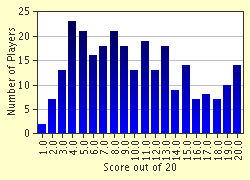Quiz Answer Key and Fun Facts
1. There are three caskets in "The Merchant of Venice." Which of the following does the lead casket best symbolize?
2. A vice character in a medieval morality play was basically the devil incarnate, a character who acted out evil without a defined motive. Shakespeare also employed vice characters in his dramas. Which of the following Shakespearean characters might qualify as a "vice" character?
3. "King Lear" is, in one sense, about the relationships between fathers and children. We know of Lear and Cordelia's misunderstanding, but there is also a subplot about another parental conflict. Gloucester reconciles with what child by the end of the play?
4. This play introduces us to an "infected world" full of "painted pomp" in which the "winter wind" is less unkind than "man's ingratitude." Yet it also tells us that suffering has a purpose, that "sweet are the uses of adversity."
5. A character in this play says that "as flies to wanton boys are we to the gods." But by the end of the tale, he has found redemption in suffering, and "the wheel is come full circle," with the evil punished.
6. This sensitive king sincerely believed that "Not all the water in the rough rude sea / can wash the balm off from an anointed king."
7. In his later plays, only commoners spoke in prose, and Shakespeare used a great many rhymed couplets.
8. Shakespeare's "Much Ado About Nothing" boasts a character named Dogberry, who is a famous fount of malapropism. But who in "Measure for Measure" seems to have a problem with the meaning of words?
9. At least three different kinds of love are depicted in "As You Like It." Which kind is exemplified by Touchstone and Audrey?
10. What two plays focus most on the theme of law/justice vs. mercy?
11. If it's not quite a tragedy, and not quite a comedy, what do scholars usually call it?
12. In Shakespeare's comedies, we usually get an absolute moral standard, a hero with nobility of spirit and high character, and a story that emphasizes man's great potential.
13. The English have long looked to cross-dressing as a source of comedy. Which of these heroines disguised herself as a doctor of laws named Balthasar?
14. In Jaques's "All the world's a stage" speech, to what does the lover make an ode?
15. Which of the following is not a song from one of Shakespeare's plays?
16. "____ is not ___, / Which alters when it alteration finds." What word is missing from this quotation form Sonnet 116?
17. Complete the close of Sonnet 94: "For sweetest things turn sourest by their deeds; / Lilies that fester smell far worse than ____."
18. What is the first record we have of Shakespeare's life?
19. To whom did Shakespeare dedicate "Venus and Adonis" and "The Rape of Lucrece"?
20. What Shakespearean poem features Tarquinius Sextus, the son of the seventh and last King of Rome?
Source: Author
skylarb
This quiz was reviewed by FunTrivia editor
Bruyere before going online.
Any errors found in FunTrivia content are routinely corrected through our feedback system.


